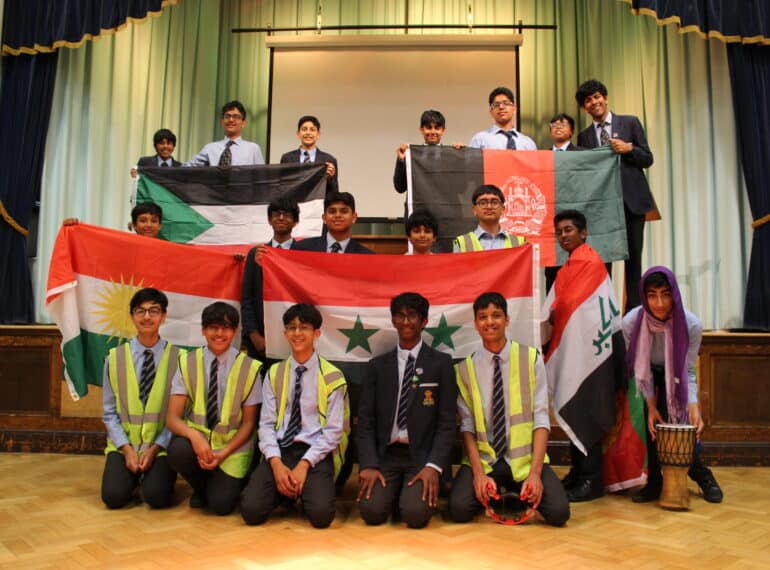
QE’s young actors took audiences for this year’s School Play on a trip to The Jungle – the unofficial camp in Calais for migrants and refugees that gained notoriety for its poor conditions during its brief existence.
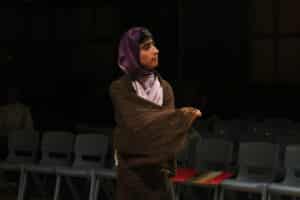 Performed during national Refugee Week, the play, which is itself called The Jungle, gave a voice to some of the thousands of men, women and children from many different countries who lived in the camp while trying to gain access to the UK.
Performed during national Refugee Week, the play, which is itself called The Jungle, gave a voice to some of the thousands of men, women and children from many different countries who lived in the camp while trying to gain access to the UK.
Assistant Head (Pupil Involvement) Crispin Bonham-Carter said: “This was an excellent production, with powerful and moving performances from a young but talented cast. It provided an important perspective on a set of issues so often debated in the media, and the stories of those in the Jungle resonated strongly.
“The boys seemed to revel in taking on such complex and contemporary issues, approaching the work with great maturity, respect and intensity.
“It was particularly topical, not just because it was performed during Refugee Week, but also because our School is this week marking One World Week, which is a celebration of inclusivity and an exploration of global issues.”
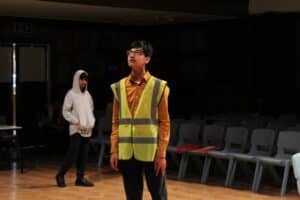 An award-winning play, The Jungle was written by two young playwrights, Joe Murphy and Joe Robinson, who met while studying English at Oxford. In the autumn of 2015, they first came to the Jungle camp, returning a short time later after crowdfunding to bring an 11m white geodesic dome there to serve as a theatre and community & arts space. They then spent seven months volunteering in the Jungle, before the authorities took down the encampment in 2016.
An award-winning play, The Jungle was written by two young playwrights, Joe Murphy and Joe Robinson, who met while studying English at Oxford. In the autumn of 2015, they first came to the Jungle camp, returning a short time later after crowdfunding to bring an 11m white geodesic dome there to serve as a theatre and community & arts space. They then spent seven months volunteering in the Jungle, before the authorities took down the encampment in 2016.
While fictional, the stories told by characters in the play were based closely on what the two writers heard during their time in the camp.
QE’s production in the Main School Hall, directed by Gavin Lister, of RM Drama, featured a 20-strong cast, with most of the boys involved drawn from Years 8 and 9.
Two boys, Aahan Shah, of Year 8, and Jeevan Karthick Thiyagarajan, of Year 9, shared the key role of Safi. “Safi was both the narrator and an active part of the plot, and Aahan and Jeevan interchanged throughout the play to deliver this role very effectively indeed,” said Mr Bonham-Carter, who was himself a professional actor before pursuing his teaching career.
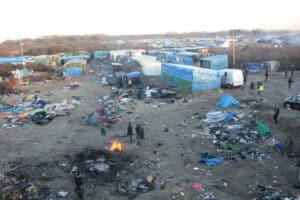 Aahan said: “Playing the role of someone who has been far less privileged than myself and has had many different experiences has been really interesting. Additionally, the character I played weaves himself in and out of the story, as if controlling it and the perspective, which was something really challenging but also really fun!”
Aahan said: “Playing the role of someone who has been far less privileged than myself and has had many different experiences has been really interesting. Additionally, the character I played weaves himself in and out of the story, as if controlling it and the perspective, which was something really challenging but also really fun!”
Fellow cast member Danyal Rahim, of Year 8, who played the character, Yasin, said: “Being involved in this play has been a wonderful experience! Rehearsals with the older boys, and with others in my year, has helped me expand my interpersonal skills and my QE community,” he said, adding that the The Jungle had illuminated the “positive human side ” of the situation that refugees found themselves in.
Year 9’s Rehaan Shaikh, who played Ben, appreciated the opportunity that participation in rehearsals had given him both to make new friends and to express his creativity.
Drama has enjoyed a resurgence at QE in recent years. Work on a new facility for drama and the spoken word, The Robert Dudley Studio, is due to start this year.

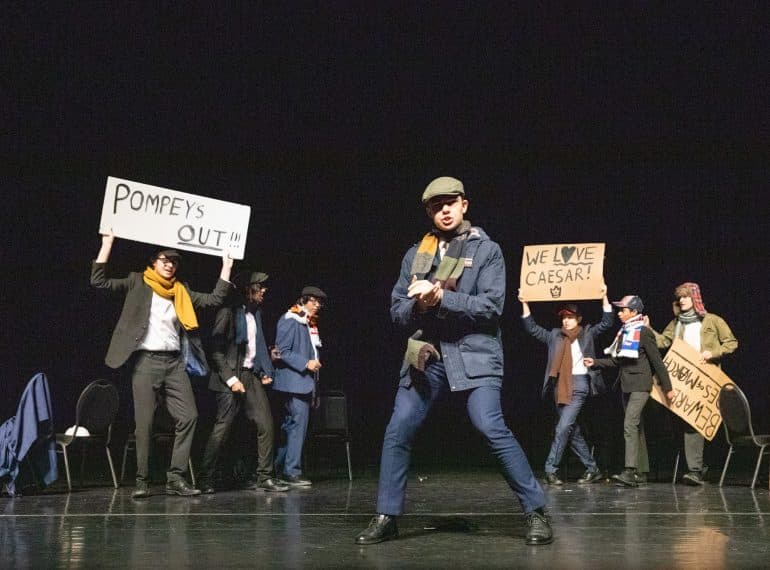
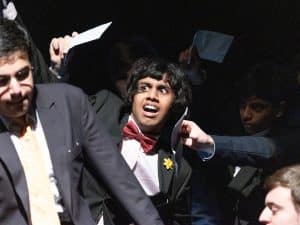 The boys put on Julius Caesar at North Finchley’s artsdepot in the Shakespeare Schools Festival and then twice in School to Years 9 and 11 as part of QE’s inaugural Shakespeare and Latin Festival.
The boys put on Julius Caesar at North Finchley’s artsdepot in the Shakespeare Schools Festival and then twice in School to Years 9 and 11 as part of QE’s inaugural Shakespeare and Latin Festival.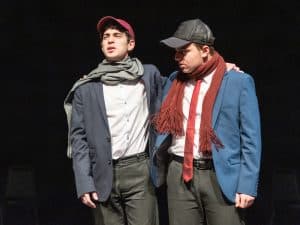 “Many congratulations should go to the whole cast and crew, as the actors allowed some of Shakespeare’s most famous lines to shine – from Mark Antony and Brutus’ soaring funeral orations to Caesar’s resigned acceptance of his fate,” said Mr Hyland.
“Many congratulations should go to the whole cast and crew, as the actors allowed some of Shakespeare’s most famous lines to shine – from Mark Antony and Brutus’ soaring funeral orations to Caesar’s resigned acceptance of his fate,” said Mr Hyland.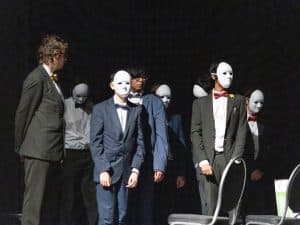 “The students have embraced the themes and the concept, and they have provided more pieces of inspired drama and theatricality than I could have hoped for. For that, and for their general work ethic and insatiable enthusiasm, I thank them,” Mr Lister added.
“The students have embraced the themes and the concept, and they have provided more pieces of inspired drama and theatricality than I could have hoped for. For that, and for their general work ethic and insatiable enthusiasm, I thank them,” Mr Lister added.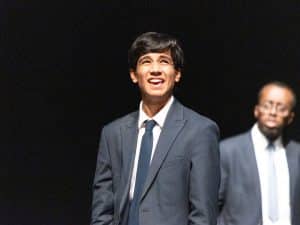 Year 11 actor Uday Dash said: “I had to adapt and build Cassius into a manipulative, calculating character, which was both a challenge and a unique experience.”
Year 11 actor Uday Dash said: “I had to adapt and build Cassius into a manipulative, calculating character, which was both a challenge and a unique experience.”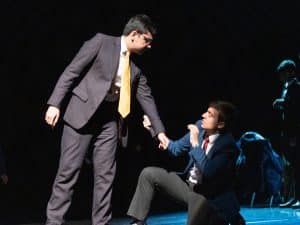 Assistant Head (Pupil Involvement) Crispin Bonham-Carter said: “Dr Pillinger drew out the links between Baz Luhrmann’s film of The Great Gatsby, Fitzgerald’s novel and the ancient Latin text, The Feast of Trimalchio.”
Assistant Head (Pupil Involvement) Crispin Bonham-Carter said: “Dr Pillinger drew out the links between Baz Luhrmann’s film of The Great Gatsby, Fitzgerald’s novel and the ancient Latin text, The Feast of Trimalchio.”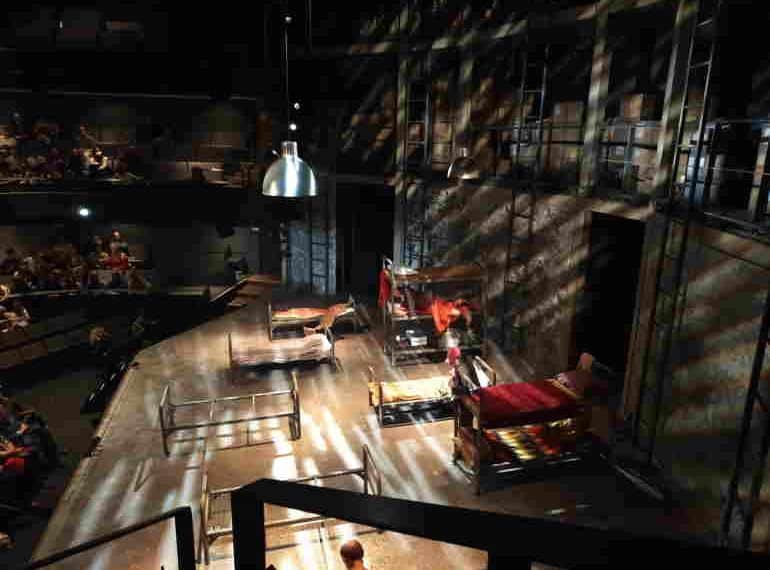
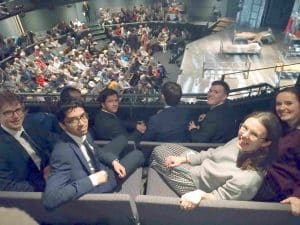 The group of Year 12 and Year 13 German students took the train to Kingston to watch The Caucasian Chalk Circle (Der kaukasische Kreidekreis) in the town’s Rose Theatre.
The group of Year 12 and Year 13 German students took the train to Kingston to watch The Caucasian Chalk Circle (Der kaukasische Kreidekreis) in the town’s Rose Theatre.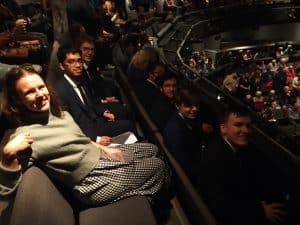 The visit reinforced the boys’ Sixth Form German studies. The Sixth Form course covers Berlin and its cultural scene. Brecht lived and worked in East Berlin for a large part of his career, although The Caucasian Chalk Circle was written in the United States, where Brecht was living in exile during the war.
The visit reinforced the boys’ Sixth Form German studies. The Sixth Form course covers Berlin and its cultural scene. Brecht lived and worked in East Berlin for a large part of his career, although The Caucasian Chalk Circle was written in the United States, where Brecht was living in exile during the war.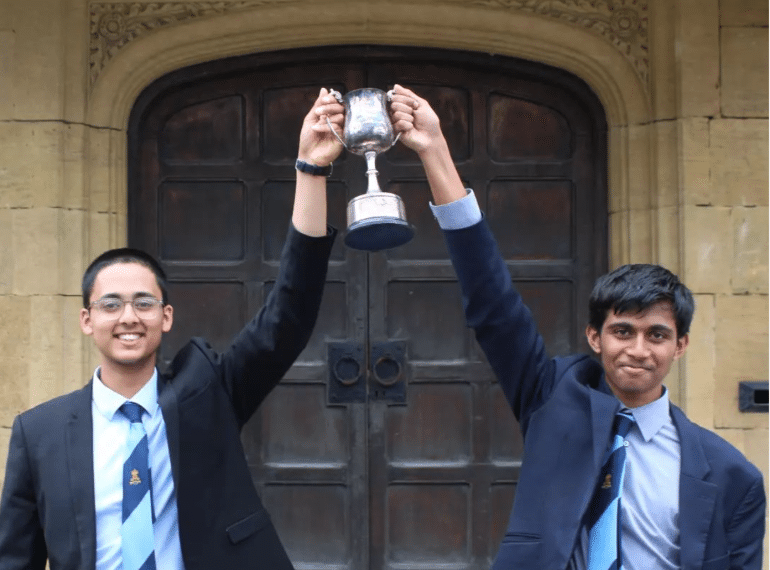
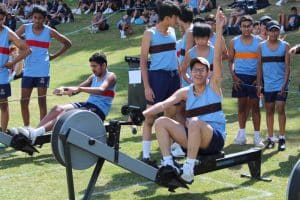 Headmaster Neil Enright said: “My congratulations go to Harrisons’ House Captain, Utkarsh Bhamidimarri, his deputy, Anubhav Rathore, [both of Year 12] and to all the members of the House. Their impressive victory demonstrates how a combination of unflinching determination, high levels of enthusiastic participation and good organisation can often turn around unpromising situations.”
Headmaster Neil Enright said: “My congratulations go to Harrisons’ House Captain, Utkarsh Bhamidimarri, his deputy, Anubhav Rathore, [both of Year 12] and to all the members of the House. Their impressive victory demonstrates how a combination of unflinching determination, high levels of enthusiastic participation and good organisation can often turn around unpromising situations.” One of the biggest contributors to the overall points total is Sports Day, held near the end of the Summer Term. All The Houses battled hard at Sports Day, including Harrisons’, although this year, as in 2019 and 2021 (2020’s Sports Day being cancelled), the winning House was again Broughton.
One of the biggest contributors to the overall points total is Sports Day, held near the end of the Summer Term. All The Houses battled hard at Sports Day, including Harrisons’, although this year, as in 2019 and 2021 (2020’s Sports Day being cancelled), the winning House was again Broughton. The latter included the 10km sponsored walks undertaken by pupils from Years 7–9, which, like Sports Day, formed part of this year’s QE Enrichment Week.
The latter included the 10km sponsored walks undertaken by pupils from Years 7–9, which, like Sports Day, formed part of this year’s QE Enrichment Week. They slaked their thirst with water delivered to them en route by Assistant Head (Pupil Involvement) Crispin Bonham-Carter and Extra-curricular Enrichment Tutor Katrin Hood, who organised the walks.
They slaked their thirst with water delivered to them en route by Assistant Head (Pupil Involvement) Crispin Bonham-Carter and Extra-curricular Enrichment Tutor Katrin Hood, who organised the walks.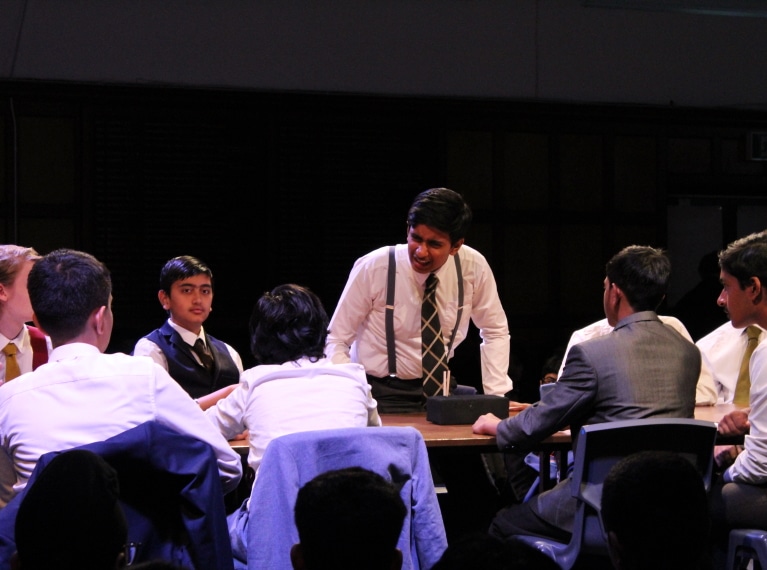
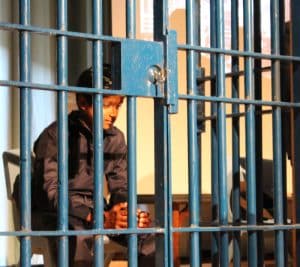 12 Angry Men was written by prolific playwright and TV dramatist Reginald Rose and turned into a critically acclaimed film by multi-award winning director Sidney Lumet. Although penned nearly 70 years ago, the themes of prejudice, race, status and justice still resonate strongly today.
12 Angry Men was written by prolific playwright and TV dramatist Reginald Rose and turned into a critically acclaimed film by multi-award winning director Sidney Lumet. Although penned nearly 70 years ago, the themes of prejudice, race, status and justice still resonate strongly today.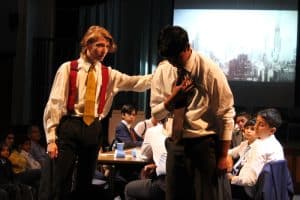 “Augie was a picture of calm, as he gently unpicked the easy assumptions of the other jurors, while the Bhowmick brothers – Krishn and Koustuv, of Years 9 and 10 respectively – were exceptional in their portrayal of embittered, middle-aged jurors 3 and 10,” said Mr Bonham-Carter.
“Augie was a picture of calm, as he gently unpicked the easy assumptions of the other jurors, while the Bhowmick brothers – Krishn and Koustuv, of Years 9 and 10 respectively – were exceptional in their portrayal of embittered, middle-aged jurors 3 and 10,” said Mr Bonham-Carter.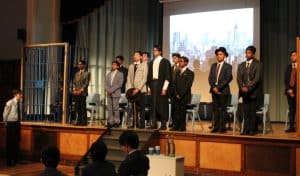 Juror 7, Saim Khan, of Year 10, said: “Drama has been a uniquely amazing experience in that it has enabled me to work closely with people from different year groups. Whilst there have been many challenges such as learning lines, the length of the play and learning cues, it has been immensely rewarding.”
Juror 7, Saim Khan, of Year 10, said: “Drama has been a uniquely amazing experience in that it has enabled me to work closely with people from different year groups. Whilst there have been many challenges such as learning lines, the length of the play and learning cues, it has been immensely rewarding.”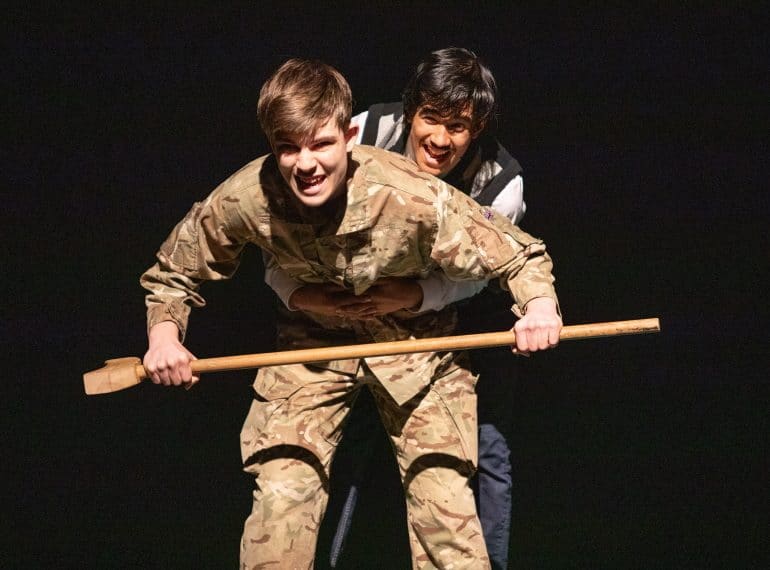
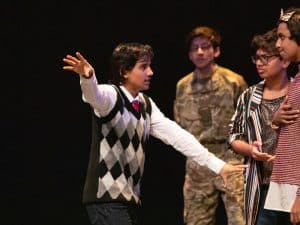 The production of the tragedy, performed during the SSF at the Arts Depot in Finchley and then again in School to Year 11, was a central part of the inaugural QE Shakespeare Festival. This week-long celebration of the works of England’s greatest playwright was brought to an end by an “inspiring” and “hugely entertaining” lecture to Year 10 from John Mullan, a professor of English at University College London.
The production of the tragedy, performed during the SSF at the Arts Depot in Finchley and then again in School to Year 11, was a central part of the inaugural QE Shakespeare Festival. This week-long celebration of the works of England’s greatest playwright was brought to an end by an “inspiring” and “hugely entertaining” lecture to Year 10 from John Mullan, a professor of English at University College London.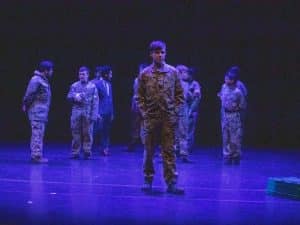 “Our boys’ performance of Othello at the Arts Depot and again at School was a dark journey into the psychology of jealousy and revenge. Patrick Bivol [Year 11] played Iago with a hands-in-pockets insouciance that made his lies and plotting deliciously painful to watch, while Sultan Khokhar [Year 13] gave the Moor [Othello himself] a calm nobility as he met his tragic downfall.
“Our boys’ performance of Othello at the Arts Depot and again at School was a dark journey into the psychology of jealousy and revenge. Patrick Bivol [Year 11] played Iago with a hands-in-pockets insouciance that made his lies and plotting deliciously painful to watch, while Sultan Khokhar [Year 13] gave the Moor [Othello himself] a calm nobility as he met his tragic downfall.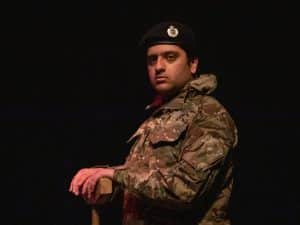 Professor Mullan is a regular TV and radio broadcaster and a literary journalist; he writes on contemporary fiction for The Guardian and was a judge for the 2009 Man Booker Prize.
Professor Mullan is a regular TV and radio broadcaster and a literary journalist; he writes on contemporary fiction for The Guardian and was a judge for the 2009 Man Booker Prize.